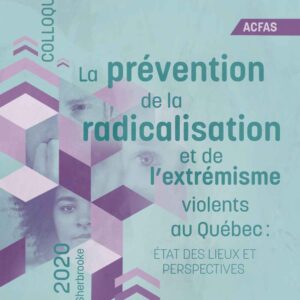 Please note that, due to the COVID-19 crisis, the event has been cancelled.
Please note that, due to the COVID-19 crisis, the event has been cancelled.
In collaboration with CPN-PREV, the CPRMV, the CEFIR, the IRIPI and the ICPC, the UNESCO Chair in Prevention of Radicalisation and Violent Extremism (UNESCO-PREV Chair) and the Research and Action on Social Polarisations (RAPS) team co-organize a two-day conference on the outcomes and perspective from initiatives and practices in the field of prevention of radicalisation and violent extremism in Québec. The event will take place on from May 7th to May 8th 2020 at the University of Sherbrooke, as part of the Association franco-canadienne pour l’avancement des sciences (ACFAS) annual congress, the largest multidisciplinary, multiuniversity and intersectoral scientific event in the French-speaking world. Researchers from various fields and universities as well as actors from the government and practitioners from the education, health and community sectors will gather to discuss these issues and the progress seen in the last couple of years.
Context
Following the rise of terrorist or extremist acts in various regions around the globe, prevention and intervention programs multiplied over the last couple of years. In Québec, where different variations of violent extremism occurred, the government presented a concerted response through its action plan titled «La radicalisation au Québec : agir, prévenir, détecter et vivre ensemble» [Radicalisation in Québec : Acting, Preventing, Detecting and Living Together). This interdepartmental action plan, which ended on March 31st, 2019, allowed the implementation of more than fifty measures in different sectors such as security, health and social services, education, immigration, community, research or international action. For its part, the Government of Canada, through its National Strategy on Countering Radicalization to Violence and the Canada Centre for Community Engagement and Prevention of Violence, also supported a certain amount of initiatives in Québec. During the last four years, tens of initiatives in sectors as diverse as the development of knowledge, large-scale or targeted awareness and training campaigns, the support of alternative discourses or tailored interventions aimed at helping people disengage from violent ideologies in primary, secondary and tertiary prevention.
Although these initiatives undoubtedly contributed to the improvement of our collective comprehension of the phenomenon in Québec and to the development of measures and tools to face it, several important questions arise. The conference will offer a critical review of the actions in the field of prevention that were undertaken during the last several years in Québec as part of a dialogue and a sharing of experiences between practitioners, social workers and researchers in the sector of prevention. The event will bring to light the successes, the mistakes, the challenges and the upcoming perspectives in the field of prevention and evaluation of violent radicalisation and extremism in Québec.
Register now
To register or to get more information, please email us (info@chaireunesco-prev.ca).
